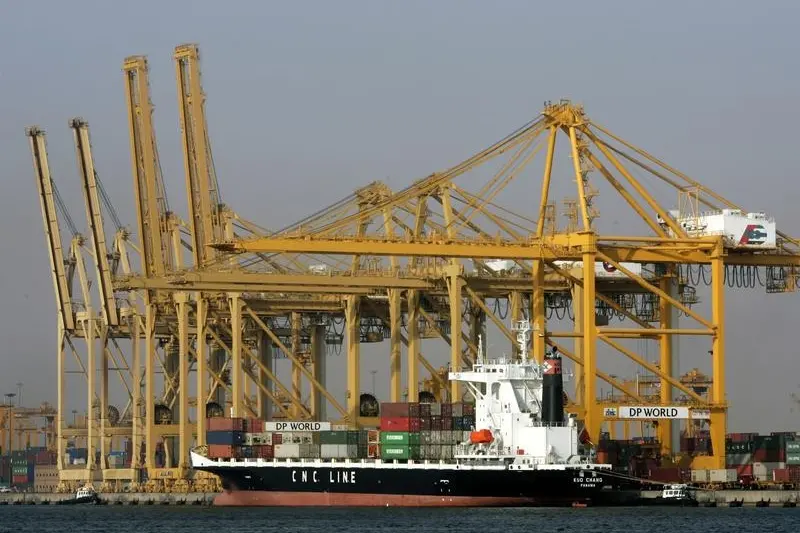PHOTO
Global trade growth is expected to continue this year, but faces a threat from increasing protectionism, according to a senior World Trade Organisation official.
In a Q&A interview distributed by the organisers of the three-day Annual Investment Meeting that gets underway in Dubai on Monday (April 9), Yonov Frederick Agah, the deputy director-general of the World Trade Organisation (WTO) said that although “economic data and forecasts from the IMF [International Monetary Fund], OECD [Organisation for Economic Co-operation and Development] and World Bank, among others have been revised steadily upwards over the last year”, trade frictions and geopolitical tensions have risen sharply in recent months.
Indeed, although the IMF's most recent World Economic Outlook released in January predicted global growth of 3.9 percent this year, Agah said that “increased use of restrictive trade measures – and the retaliation that this would invite – could easily undermine a generally positive outlook for trade”.
“Inward-looking policies, geopolitical tensions and political uncertainty were seen as the main downside risks,” he said.
Stock markets in the United States dipped last Friday as President Donald Trump proposed tariffs on more Chinese products, following an initial round of tit-for-tat measures that had seen the US impose tariffs of steel and aluminium imported from China, only for China to react by imposing tariffs on a range of US goods, including soybeans, aircraft, chemicals and automobiles.
The WTO is due to release its annual trade statistics for 2017 and its trade forecast on Thursday, but Agah said that its most recent World Trade Outlook Indicator published in February pointed to continued solid growth in trade in the first quarter of 2018, with indices measuring container port throughput, air freight shipments and export orders from purchasing managers' data all showing an expansion.
“However, continued recovery is predicated on stability of the current trading environment, which is tenuous and could easily be reversed by political tensions and trade frictions,” Agah said. “Member countries should use the multi-lateral system to resolve their differences and prevent economic uncertainty from undermining growth.”
In a separate Q&A, Ewa Synowiec, a chief advisor to the European Commission and the General Directorate of Trade, said that trade between the European Union and the Gulf region reached €143 billion ($175.7 billion) in 2017, with €100 billion of this representing exports from the EU to Gulf Cooperation Council (GCC) countries.
Synowiec added that the United Arab Emirates is the EU's biggest trade partner in the region, with total trade between the EU and the UAE reaching €55.6 billion last year - €42 billion of which was exported from the EU into the UAE.
Machinery and transport equipment make up more than half of EU exports to the UAE, with manufactured goods and chemicals the other main categories.
The main imports into the EU from the UAE were fuels and lubricants, as well as manufactured goods. Trade in services between the EU and UAE amounted to €15 billion, Synowiec said.
Although the GCC region witnissed "the weakest real GDP growth" in several years during 2017 as a result of lower energy prices, according to Synowiec, efforts by governments to diversify revenues away from oil have progessed, she argued.
"There is a great potential to further increase our mutual trade both at the GCC level and bilaterally between the UAE and the EU. The efforts taken by the GCC countries - with the UAE in the lead - to diversify their economies will lead to expansion of their export base and is likely to reduce the current trade deficit that the GCC has with the EU," Synowiecz said. "Investment by EU companies to the GCC will have a crucial role in this transformation process."
The UAE had been placed on a tax haven blacklist by the European Union in December last year, when EU finance ministers announced that it was taking action against 17 jurisdictions (which also included Bahrain), citing a lack of tax transparency.
However, the UAE and seven other nations were removed from the blacklist in January after it signed a total of 113 new agreements - some of which covered transparency, while others were signed to avoid double taxation. Bahrain was removed from the blacklist last month, alongside the Marshall Islands and St Lucia.
The Annual Investment Meeting runs from April 9-11 at the Dubai World Trade Centre. Data published last week by the UAE's Competitiveness and Statistics Authority stated that foreign direct investment into the country increased by 7 percent last year to $10.3 billion - up from $9.6 billion in 2016.
Further reading:
- Sunday Outlook: Global markets drop on trade tensions
- Oil falls on Trump's latest China trade threats
- Global Free Zones $3.5tln worth of annual exports boosting FDI
- Middle East consumers becoming more cost-conscious
- Annual Investment Meeting lines up top-notch global experts
- Khalifa Fund to showcase 20 projects at AIM
(Writing by Michael Fahy; Editing by Shane McGinley)
(michael.fahy@thomsonreuters.com)
Our Standards: The Thomson Reuters Trust Principles
Disclaimer: This article is provided for informational purposes only. The content does not provide tax, legal or investment advice or opinion regarding the suitability, value or profitability of any particular security, portfolio or investment strategy. Read our full disclaimer policy here.
© ZAWYA 2018





















